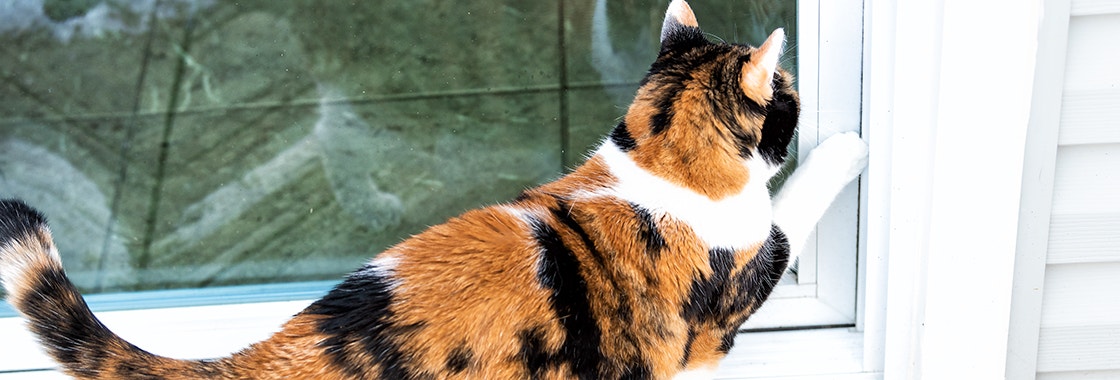- Homepage
- Blog
- Bonding & Care
- How To Stop Cats From Scratching Doors
How to stop cats from scratching doors


Share
Cats have many instinctive behaviours that we adore, but a common behaviour that may not be fun for cat parents is a cat scratching on the door. Not only can the sound be irritating, especially at night, but your doors could also get damaged. It’s important to remember that cats don’t engage in behaviours just to be annoying (although it might feel like it) and there is usually a reason. In this article, we look at the reasons why your cat is scratching the door and different methods to stop cats from scratching doors. Cat parents first need to learn what is causing the behaviour in order to help improve it.
Why is my cat scratching the door?
There are various possible reasons why cats scratch the door. Your clingy cat may be trying to get your attention for food, play or affection, or could be stretching their muscles, marking their territory, feeling bored or stressed, or simply maintaining their claws. Since scratching is a natural behaviour in cats, your cat may be scratching the door for any one of the reasons listed above, as well as for different reasons each time, which is why it may be hard for cat parents to pinpoint why. If you need your cat to stop scratching at the door, our article can help you find ways to discourage the behaviour.
Tips on how to stop your cat scratching the door
1. Understand why your cat is scratching
In order to stop cats from scratching doors, cat parents need to try and understand why their cat is doing it by observing the context. If your cat scratches the door at night, they may be seeking entry, food, play or affection. But if your cat is scratching the door when you’re not around, you may find a pet camera useful in assessing their body language and verbal cues.
2. Provide alternative scratching surfaces
An effective way to stop your cats from scratching the carpet or doors is to provide plenty of appropriate surfaces for them to use. You may want to experiment with vertical posts or horizontal pads, as well as different textures such as fabric, rope or cardboard, to see what your cat prefers. Place these options near the door your cat is scratching so they have an alternative instead. You can also offer treats to reward your cat when they use a scratching post or pad, to help them understand this is a desirable behaviour. Similarly, you can distract your cat away to stop them from scratching the door.
3. Trim your cat’s nails regularly
Cats' claws grow continually, just like our nails, however, they naturally shed the outermost layer of the claw regularly. As a natural predator, the reason why your cat scratches objects is instinctive in order to keep their claws sharp as an efficient tool for hunting and climbing. In this case, your cat could be scratching on the door to remove the outer nail sheath to reveal sharper nails underneath. If you’re concerned that your cat’s claws are too long, you can consult a veterinarian.
4. Engage in plenty of physical exercise
If you find your cat scratches the door at night once you’ve closed your bedroom door to sleep, they may have pent up energy. By playing with your cat before bedtime, your cat will get some physical exercise to tire them out - making them more likely to wind down to rest afterwards (and leave you in peace too!).
5. Offer stimulating toys and furniture
Your cat could be scratching the door because they’re bored and need more stimulation. You should provide stimulating toys to keep them busy when they’re alone, such as a laser toy or puzzle feeder. Cat trees and perches can also entertain cats for hours, and help stop cats scratching doors at night.
6. Change your cat’s feeding schedule
To stop your cat from scratching the door for food, you may need to adjust their feeding schedule. It’s helpful to feed your cat close to bedtime, so they feel content enough to sleep.
7. Install a cat door if your cat goes outside
Outdoor cats may be scratching on the door in order to be let outside if you don’t have a cat flap. It may be helpful to install a cat flap so your cat can come and go as they please. This will hopefully stop your cat from scratching the door at night.
8. Place a physical barrier on/to your door
Sometimes you may need to protect your door from damage by putting plastic sheeting over it or placing a baby gate in front of it to restrict your cat’s access and stop your cat scratching the door. Applying cat-repellent sprays or tin foil to your door can also deter them.
9. Take your cat to the veterinarian
If your cat has suddenly started scratching the door, there may be an underlying health concern. Cat parents should observe any other changes in their cat’s behaviour, as well as unusual symptoms. By consulting a veterinarian, you can rule out health problems that could be causing your cat to scratch the door at night.
10. Consult a cat behaviourist
If your cat’s behaviour persists after you’ve ruled out an underlying medical condition and tried other measures to stop your cat from scratching doors, you may want to consult a cat behaviourist. This is particularly helpful if your cat is experiencing stress or anxiety, as they can help you work out the underlying trigger and support you in making your cat feel safe.
How can I train my cat to stop scratching doors?
- Ignore your cat scratching the door. It’s important to not give any attention when your cat is scratching on the door, as doing so will only reinforce the behaviour. Unless your cat is in pain or distressed, don’t open the door, call to, play with or feed your cat. They will soon learn their behaviour doesn’t get them what they want, and this can help stop cats scratching doors at night.
- Positive reinforcement and clicker training. When your cat avoids scratching the door or uses an appropriate scratching surface, reward them with praise and a treat. You can also use a clicker to make a sound and contribute towards a positive association with the desired behaviour.
- Negative associations with the door. You can make your door less appealing for your cat by spraying a cat repellent made with essential oils that cats do not like, such as cinnamon or rosemary. You can also place double-sided tape or tin foil on your door, since cats don’t like these textures on their paws, and therefore can help stop cats from scratching doors.
- Redirect your cat’s behaviour. If your cat is scratching on the door, you can redirect them to an appropriate scratching post or pad nearby and reward your cats with praise and treats when they follow your redirection.
What are other environmental enrichments to deter door scratching?
A common reason why cats scratch the door at night is usually because they’re bored. This is why caring for a cat includes dedicating time for bonding and creating a cat-friendly space that will keep them mentally stimulated to prevent boredom and stress-related scratching. It can be helpful if cat parents spend time petting and playing with their cat before bedtime, as this can help your cat feel content and tire them out to prepare for sleep afterwards.
You can also provide your cat with toys to keep them busy, such as a ping-pong ball or a puzzle feeder. You may also consider having cat furniture, besides scratching posts and pads, such as cat trees, wall-mounted perches and hammocks. Cats like to be up high to see their environment from a different point of view. A cosy spot near the window where your cat can watch birds, squirrels or even cars, will keep them stimulated for hours.
How to stop cats from scratching doors: FAQ
How do I get my cat to stop scratching at my door at night?
To stop your cat scratching your door at night, it’s important to understand what they want. If your cat wants attention from you, engage in playtime before bed, or if your cat needs stimulation, provide plenty of appropriate toys. Placing a scratching post/pad of your cat’s preference nearby can also help stop your cat from scratching the door at night.
What does a cat pawing door mean?
A cat pawing at the door could be due to several reasons. Your cat may paw at the door if they want to enter or exit the room, seeking attention or affection or if they’re feeling bored, anxious or even hungry. Cat parents will need to observe the context surrounding their cat pawing at the door to address the behaviour.
Why do cats scratch more at night?
Cats may scratch more at night because they are crepuscular animals and tend to be more active at this time due to their hunting instincts. Cats also sleep for most of the day, and therefore have pent-up energy when it comes to night. Since they may be bored, cats scratch more at night to seek attention from their owners.
Should I leave my bedroom door open for my cat?
Whether or not you leave the bedroom door open for your cat depends on your preference, lifestyle and your cat’s behaviour. Access to your bedroom can strengthen your bond, eliminate scratching at the door and reduce your cat’s anxiety. However, your sleep may be disrupted if your cat tries to wake you for play, food or affection.
It can be difficult for cat parents when their cats engage in undesirable behaviours, such as scratching at the door. It’s important to understand the reason for your cat’s behaviour in order to address it with the appropriate training techniques and stop your cat scratching the door. It’s also essential to provide plenty of physical and mental stimulation for your cat, including exercise, playtime and affection, to support your cat’s overall well-being. You can also satisfy your cat’s needs by feeding them Sheba® Wet Cat Food. With a variety of flavours for your cat to enjoy, you can ensure your cat is receiving a complete and balanced diet with the essential nutrients they need to support their health.











